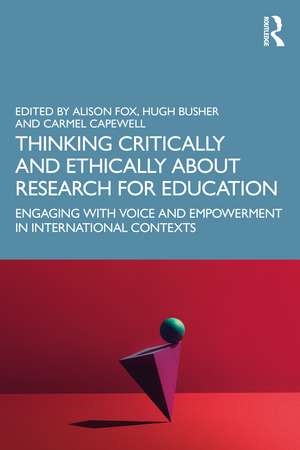Thinking Critically and Ethically about Research for Education: Engaging with Voice and Empowerment in International Contexts
Autor Alison Fox, Hugh Busher, Carmel Capwellen Limba Engleză Paperback – 30 noi 2021
Thinking Critically and Ethically about Research for Education draws on the experiences of a range of researchers in the discipline to explore the lived realities, including ethical and methodological complexities, involved in undertaking educational research.
Using global case studies, this book examines the meaning of ethical research practice and raises questions about representation, power, and empowerment in the field. It provides critical reflections from researchers; reviewing the methodologies they used in their studies and the ethical implications of these in theory and practice. The book highlights the various difficulties and realities present in education research and provides researchers with the tools necessary for refining their skill and understanding of ethical research methodologies.
The chapters reflect authors' responses to the following questions:
- What values prompted you to do this work and how did you share these with participants?
- What were the ethical considerations raised beforehand and how were these tackled in terms of meeting obligations (including to ERBs), maximising benefits and dealing with issues arising during the study and through to publication?
- What does 'empowerment' and/or 'voice' mean to you as a researcher and how did you express this to your participants?
- In what ways were the participants given opportunities to be empowered in or through your study?
With critical discussions on ethics and research practices in education research, this book is ideal for student, novice and experienced researchers looking to undertake ethical education research.
Preț: 360.01 lei
Nou
68.89€ • 71.52$ • 57.45£
Carte tipărită la comandă
Livrare economică 22 martie-05 aprilie
Specificații
ISBN-10: 036755691X
Pagini: 234
Ilustrații: 16
Dimensiuni: 156 x 234 x 13 mm
Greutate: 0.7 kg
Ediția:1
Editura: Taylor & Francis
Colecția Routledge
Locul publicării:Oxford, United Kingdom
Public țintă
Postgraduate and ProfessionalCuprins
Foreword
Section 1 Research empowering Children and Young People
Chapter 1 Introduction – Alison Fox, Hugh Busher and Carmel Capewell
Chapter 2 Persistence and perseverance: Working with University Research Ethics Committee (UREC) processes to elicit children’s views, voices and volitions -
Deb McGregor, Sarah Frodsham Clarysly Deller
Chapter 3 Building a case for inclusive ways of knowing through a case study of a cross-cultural research project of out-of-school girls’ aspirations in Zimbabwe: practitioners’ perspectives - Liz Chamberlain, Alison Buckler and Faith Mkwananzi
Chapter 4 Well That’s another Fine Mess You Got Me Into: The Jargon of Research (How do we translate this for the participant with additional needs?) - Carol-Ann O’Síoráin, Connor McGuckin and Kate Carr-Fanning
Chapter 5 Hearing students’ voices through photo-narratives that elicit their views on relationships and power in schools - Hugh Busher
Chapter 6 Diaries and hearing maps from a diagnostic tool to a communication device between adults and 3-7 year old children with glue ear - Carmel Capewell
Chapter 7 Listening to silence in the quest to offer migrant learners a ‘voice’ through picturebook research in South Africa - Helen Hanna
Section 2 Research empowering adults and for professional learning
Chapter 8 Teacher empowerment within Twitter chats: A more-than-human perspective -
Martina Emke
Chapter 9 Ethical Reflections on Ethnographic Exposure of Exclusion in PBL Group-learning - Gerd Christensen
Chapter 10 Methods for and with refugees: issues of vulnerability and participation of displaced people in camps on the Thai-Burma border – Victoria Jack
Chapter 11 Socio-mapping and the relational resilience of and for training teachers - Alison Fox, Kate Sida-Nicholls and Rob Loe
Chapter 12 Critical realist research: ethical issues and dilemmas as illustrated through a doctoral study in an African university - Kris Stutchbury
Chapter 13 Mature students use of free-drawn mind diagrams to express the struggles of their learning journeys: Ethics, identity and power - Hugh Busher and Nalita James
Section 3 Critical appraisal of ethics and research
Chapter 14 Critical ethical reflexivity: Reflections for practice and knowledge - Alison Fox and Hugh Busher
Chapter 15 Developing Phrónēsis: Challenges and opportunities - Hugh Busher, Alison Fox and Carmel Capewell
Notă biografică
Hugh Busher is an Honorary Associate Professor in the School of Education, University of Leicester, UK.
Carmel Capewell is a Senior Lecturer in the School of Education at Oxford Brookes University, UK.
Descriere
Thinking Critically and Ethically about Research for Education draws on the experiences of a range of researchers in the discipline to explore the lived realities, including ethical and methodological complexities, involved in undertaking educational research.
Using global case studies, this book examines the meaning of ethical research practice and raises questions about representation, power, and empowerment in the field. It provides critical reflections from researchers; reviewing the methodologies they used in their studies and the ethical implications of these in theory and practice. The book highlights the various difficulties and realities present in education research and provides researchers with the tools necessary for refining their skill and understanding of ethical research methodologies.
The chapters reflect authors' responses to the following questions:
- What values prompted you to do this work and how did you share these with participants?
- What were the ethical considerations raised beforehand and how were these tackled in terms of meeting obligations (including to ERBs), maximising benefits and dealing with issues arising during the study and through to publication?
- What does 'empowerment' and/or 'voice' mean to you as a researcher and how did you express this to your participants?
- In what ways were the participants given opportunities to be empowered in or through your study?
With critical discussions on ethics and research practices in education research, this book is ideal for student, novice and experienced researchers looking to undertake ethical education research.
